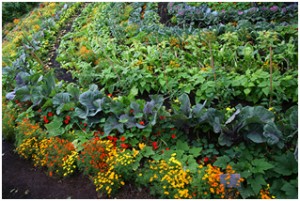 According to the International Federation of Organic Agriculture Movements, “Organic agriculture is a production system that sustains the health of soils, ecosystems and people. It relies on ecological processes, biodiversity and cycles adapted to local conditions, rather than the use of inputs with adverse effects. Organic agriculture combines tradition, innovation and science to benefit the shared environment and promote fair relationships and a good quality of life for all involved.” It is therefore a type of agriculture that works with nature rather than against it. The methods used in organic farming are internationally regulated and legally enforced by many nations, based in largely on the standards set by the International Federation of Organic Agriculture Movements (IFOAM). IFOAM is an international umbrella organization for organic farming organizations established in 1972.
According to the International Federation of Organic Agriculture Movements, “Organic agriculture is a production system that sustains the health of soils, ecosystems and people. It relies on ecological processes, biodiversity and cycles adapted to local conditions, rather than the use of inputs with adverse effects. Organic agriculture combines tradition, innovation and science to benefit the shared environment and promote fair relationships and a good quality of life for all involved.” It is therefore a type of agriculture that works with nature rather than against it. The methods used in organic farming are internationally regulated and legally enforced by many nations, based in largely on the standards set by the International Federation of Organic Agriculture Movements (IFOAM). IFOAM is an international umbrella organization for organic farming organizations established in 1972.
The main goals of organic farming are too increase long-term soil fertility; control pests and diseases without harming the environment; ensure that water stays clean and safe; use resources which the farmer already has, so the farmer needs less money to buy farm inputs; and produce nutritious food, feed for animals and high quality crops to sell at a good price. As a result, organic farming has become increasingly popular because of its many benefits. For example, organic food is said to taste better than non-organic food, it promotes diversity; the food also has more nutritional benefits; and it limits the leaching of toxins into the soil as organic farms shy away from pesticides and herbicides.
There are several foods that are highly recommended as foods to be bought organic. Some examples are strawberries, beef, popcorn, milk, celery, coffee, peaches, potatoes, peppers, leafy greens and baby foods. The organic market is growing and as a result may food items we commonly buy can now be bought organic. While organic items do cost more, the long term benefits tend to outweigh these initial costs. However, there are some foods that you may not need to buy organic. For example, avocadoes, eggs, spices, bananas, pineapples, kiwis, mangoes, papayas, asparagus, broccoli and onions do not need to be organic when bought.
Written by: Sade Richardson
University of Rochester ’15
For more tips and tricks on how and when to buy organic, check out the following links:
http://greenopolis.com/myopolis/blogs/aresende/what-you-should-shouldnt-buy-organic
http://www.huffingtonpost.com/2011/03/22/shopping-organic-_n_838675.html#s256197&title=Avocados_



I heard apples are the most commonly sprayed things! I always buy organic when I can
This is very interesting. Even though this post was made years ago it still rings true. Organic market is booming at the moment and is showing no signs of slowing down.
“Thank you for sharing such a nice blog on organic Foods, it will really help me out in future.
I have bookmarked this page for future references.
Have a good one ahead!!
“
hey there! thank you for sharing so much about organic farming. It surely is a great thing, i wish i could do that as well. No worries, i enjoyed it reading. Cheers to your post!
To angry farmer: I am sure the young lady was trying to give a general snap shot into such a complex topic. Instead of attacking the article, why didn’t you post better links that could be used? I do agree that it could have been better stated – however it was a fair attempt.
I buy lots of organic foods and I’ve found that there are some things that you may not have to buy organic. Clearly, you are lashing out at the young lady for simply presenting an alternate view to yours. Please only post positive or healthy criticism.
Sade,
Thank you for saying something for organic…
However, I do wish that this was a little more robust and less of a random ‘copy paste’ from the IFOAM website mixed with some opinions formed from mid-air.
I highly disagree with the arbitrary list of foods that you ‘may not need to buy organic’.
Do a quick google search (or better yet google scholar search) to find out about the effects of conventional banana and eggs…
Please explain your sources and reasoning…
Angry Farmer